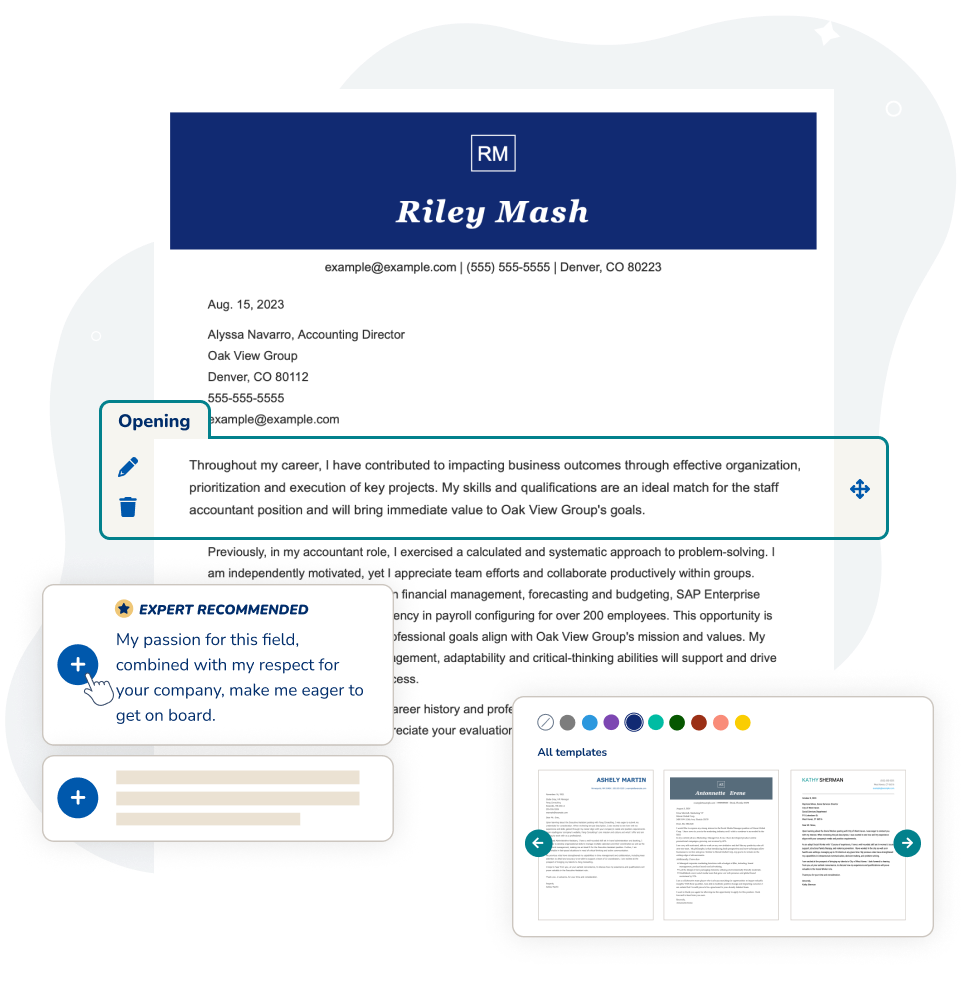Our customers have been hired at:*Foot Note
Get Hired Faster With Our AI Cover Letter Generator
Discover why MyPerfectResume is the key to securing your dream job.
3 Easy Steps to Generate Your Cover Letter
Choose a professionally designed template.
Add tailored content from career experts.
Download in the file format you need and send!
Fast-Track Your Job Search With Our Cover Letter Generator
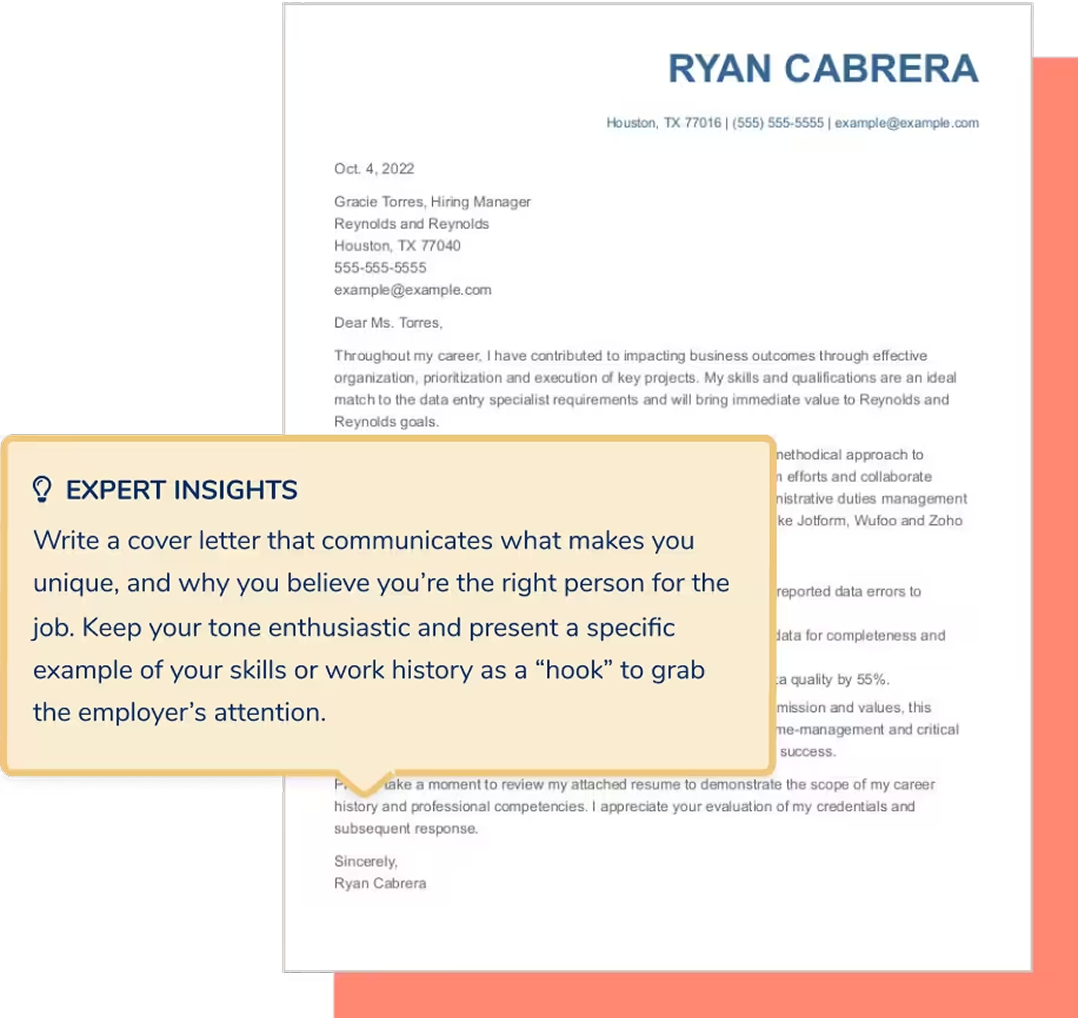
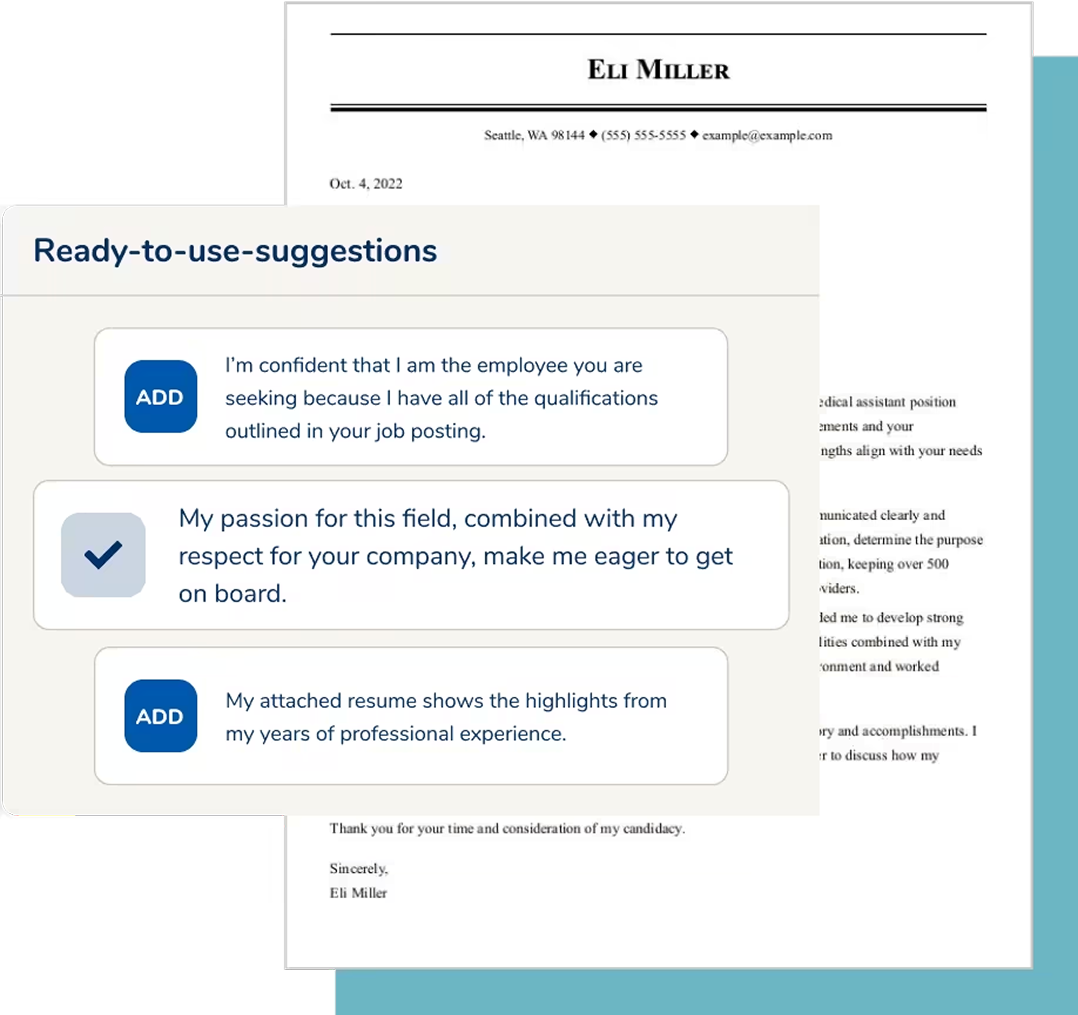
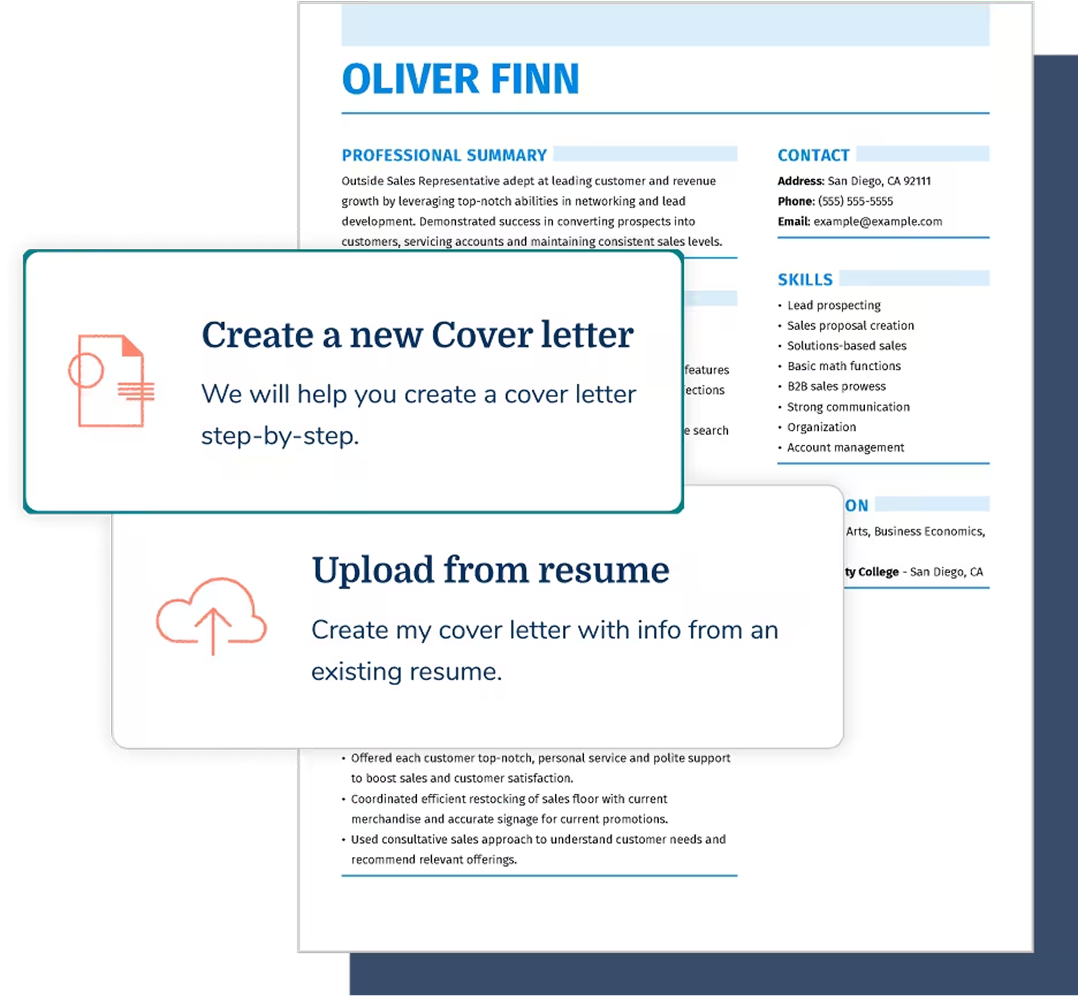
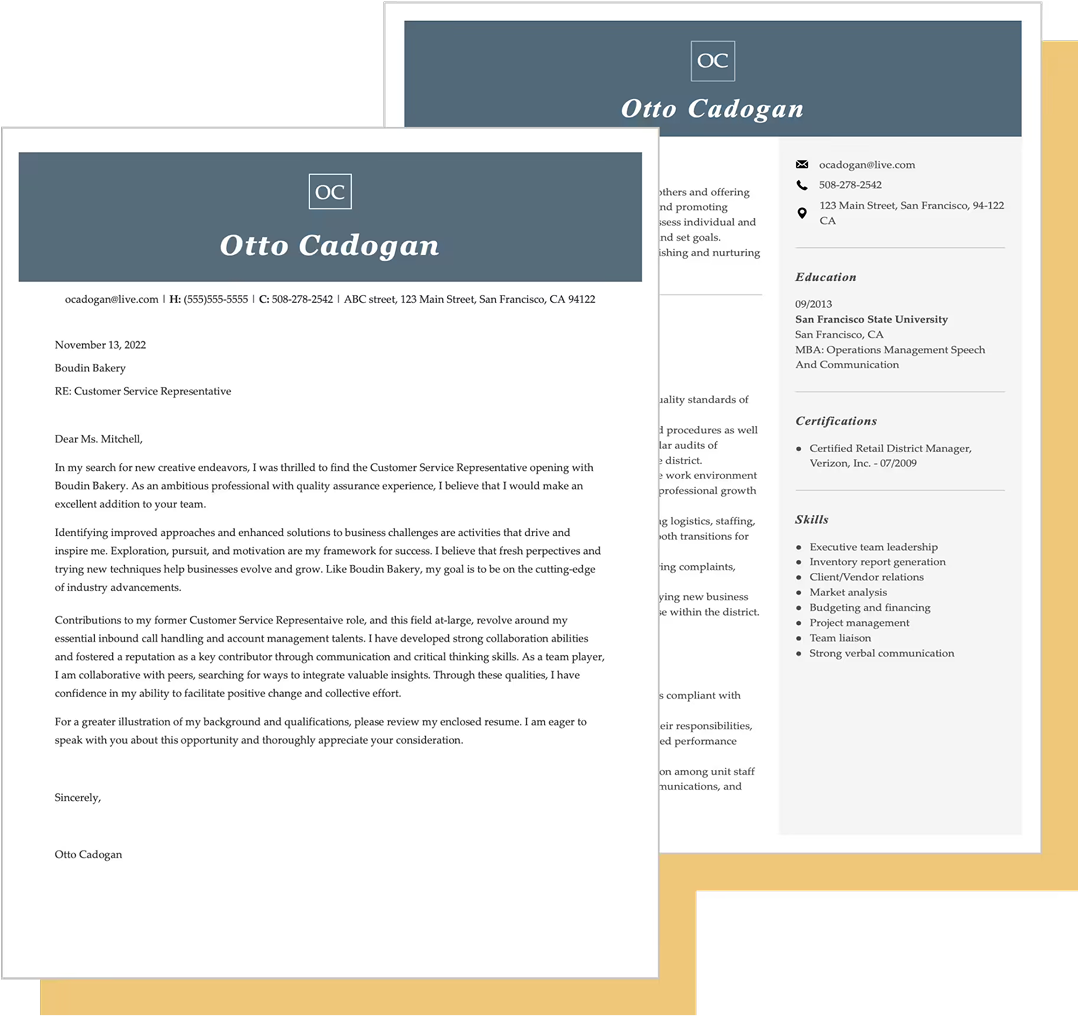
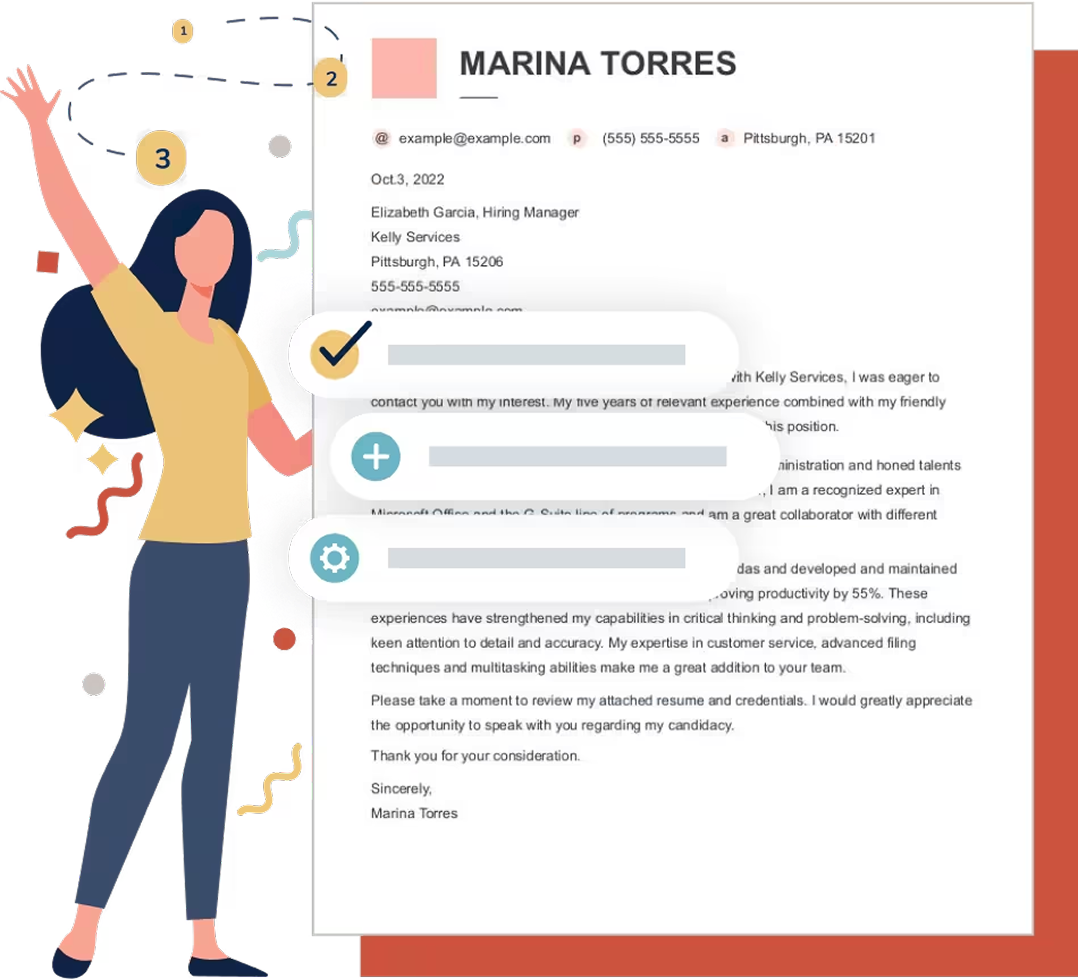
AI-assisted tips from career experts
Our Cover Letter Builder features actionable guidance from professional resume analysts. Try our Cover Letter Generator free to get tips on how to write a cover letter that wins interviews.
AI-generated content suggestions, tailored for you
Add customized content from career experts in a single click. With content tailored to your industry and experience, we’ll help you craft a cover letter that showcases your fit for the role.
Cover letter generation with your resume, powered by AI
Upload your resume to our Cover Letter Generator to instantly create a cover letter with the information from your resume. Or start from scratch with our step-by-step prompts and guidance.
AI-integrated resume and cover letter builder
Use our Resume Builder to make a matching resume. View and edit your custom resume and cover letter through a single portal, and enjoy unlimited downloads in the file format you need.
Smart AI features to advance your career
Try our Cover Letter Creator free of charge and explore job-winning features from professional templates to professionally written content. You can contact us seven days a week for all of your account needs.
200+ Professional Cover Letter Examples
Browse our library of cover letter examples to get inspired. We have professionally crafted samples for different jobs, industries, and career stages to help you get started.
Enter a job title below to find cover letter examples
Find your next roleIndustries
Frequent searches
FAQ
Last Updated:
What is an AI cover letter generator and why should I use one?
An AI cover letter generator is an online tool that uses artificial intelligence to help job seekers craft compelling cover letters by providing professionally made templates, content suggestions, and expert guidance.
Here are a few benefits of using a cover letter generator:
- Saves time: Answer a few prompts about your professional history to generate a custom cover letter in minutes.
- Ensures consistency: Using our Cover Letter Generator ensures that your cover letter’s formatting, structure, and tone are consistent and professional.
- Customizable: Our Cover Letter Builder provides content suggestions tailored to your industry and skills so that you can create a targeted cover letter for every job.
With MyPerfectResume’s Cover Letter Builder, you can create a cover letter from scratch or upload an existing one for instant reformatting on one of our templates, keeping in mind ATS design best practices.
Browse the best AI cover letter generators for additional information about the benefits of using a cover letter builder to craft a standout cover letter.
How does your AI Cover Letter Generator work?
Our AI Cover Letter Generator works by analyzing your resume, job title, and career goals to generate personalized cover letter content. It uses machine learning to suggest the most relevant achievements, skills, and tone based on your industry.
What is the best free cover letter builder?
While there is no one “best free cover letter builder”, MyPerfectResume’s Cover Letter Generator is a great resource. It features insights from career advice specialists, professional guidance, and content suggestions written by career experts.
Our Cover Letter Builder is easy to use on desktop and mobile, so you can effortlessly create and edit a cover letter from your preferred device without worrying about glitches or formatting errors.
You can create a cover letter free of charge with our Cover Letter Generator and download it in plain text (.txt) format. With Full Access, you’ll enjoy unlimited downloads in multiple file formats.
Explore our guide on the necessity of cover letters for additional information about the importance of including a compelling cover letter with your resume.
Should I customize my cover letter for every job application?
Yes, you should customize your cover letter for every job application. Similarly to a targeted resume, a personalized cover letter shows employers how your skills align with the role.
When you use our Cover Letter Generator, you can enter the job title and company you are applying to and receive tailored content suggestions to personalize your cover letter.
Additionally, we recommend reviewing the job posting carefully to identify keywords and qualifications the employer is looking for.
Then, you can highlight in your cover letter how your experience and professional skills match those requirements, increasing your chances of securing an interview.
A customized cover letter doesn’t mean completely starting from scratch for every application. You can have a basic cover letter template that you adjust slightly for each job application.
Can I edit an existing cover letter in your Cover Letter Generator?
Yes, you can upload an existing cover letter to our Cover Letter Generator for instant reformatting and content suggestions.
Simply upload as you normally would, and the builder will reformat the letter to your chosen template. Then, you can customize it to your desired job and add your personal touch.
We recommend exploring what to include in a cover letter for additional guidance on crafting a cover letter that wins interviews.
Can I make multiple cover letters with your Cover Letter Generator?
Yes, you can make more than one cover letter in our Cover Letter Generator. The builder allows you to save any letters and continue working on them later.
You also can save the letter and change the template design. With Full Access, you can download your cover letter in multiple file formats.
See our guide on how long a cover letter should be for advice from career advice experts on achieving the ideal cover letter length.
Is your Cover Letter Generator ATS-friendly?
Yes, our Cover Letter Generator is ATS-friendly. Our service will create a cover letter following ATS formatting guidelines. Many employers use application tracking systems (ATS) to scan for key skills and qualifications that they are seeking.
If your resume and cover letter are missing certain keywords, your application might not pass ATS and reach the hiring manager.
Our cover letter templates are optimized using ATS design best practices. They feature clean and simple formatting that is easily readable by screening software.
Plus, content suggestions based on your desired role or company help you target key skills and qualifications the ATS might be scanning for.
Check out our guide on how to create an ATS-friendly resume for additional tips and tricks on crafting a job application that passes automated screening and reaches hiring managers.
Where can I make a resume to send with my cover letter?
You can use our Resume Builder to make a resume that matches your cover letter. We’ll provide guidance, professionally designed resume templates, and expertly written content suggestions.
When you use our resume and cover letter builders, you’ll be able to access your resume and cover letter from a single portal for easy editing and unlimited downloads in the file format you need. You can also use our ATS Resume Checker to scan for common errors.
Need some additional help with your resume? Check out how to write a resume for guidance from career advice experts. We’ll provide actionable tips and examples to help you create a compelling resume that complements your cover letter.
How do you format a cover letter?
Format a cover letter using the standard business letter format. Our templates are built with cover letter formatting best practices in mind so that you can rest assured that your document contains all of the necessary sections. Your cover letter should include the following information:
- Header with your contact information
- Employer’s contact information
- Salutation
- Opening paragraph
- One or two body paragraphs
- Closing paragraph
- Signoff with your signature
For tips and tricks, take a look at our cover letter format guide. Try our Cover Letter Maker free of charge for step-by-step guidance on formatting your cover letter.
Is your Cover Letter Generator easy to use on mobile devices?
Yes! Our Cover Letter Generator is optimized for mobile devices, so you can easily create a cover letter from your smartphone or tablet.
Add ready-made content suggestions in a single click to save time typing and easily switch between different templates and color themes as you write without losing content or disrupting formatting.
When you preview your cover letter on your mobile device, you can trust that what you see is what you get.
When it’s time to download, your PDF won’t have any formatting or design errors and will look the same across all of your devices.
Unlock Your Career Potential With Our Cover Letter Generator
Create a standout cover letter in minutes.

Rate this article
AI Cover Letter Generator
Share this page
